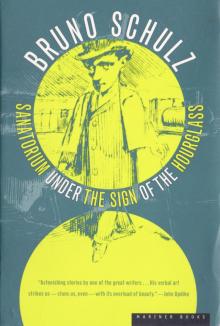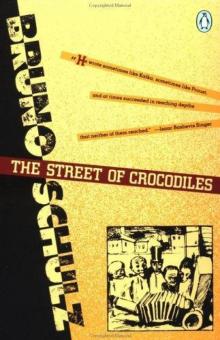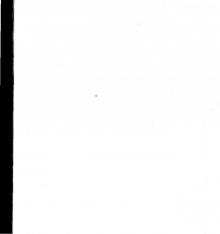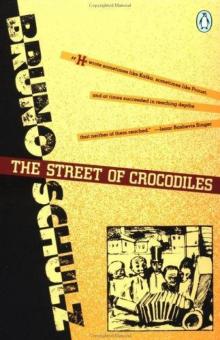- Home
- Bruno Schulz
The Street of Crocodiles Page 4
The Street of Crocodiles Read online
Page 4
What still remained of him—the small shroud of his body and the handful of nonsensical oddities—would finally disappear one day, as unremarked as the gray heap of rubbish swept into a corner, waiting to be taken by Adela to the rubbish dump.
Birds
Came the yellow days of winter, filled with boredom. The rust-colored earth was covered with a threadbare, meager tablecloth of snow full of holes. There was not enough of it for some of the roofs and so they stood there, black and brown, shingle and thatch, arks containing the sooty expanses of attics—coal-black cathedrals, bristling with ribs of rafters, beams, and spars—the dark lungs of winter winds. Each dawn revealed new chimney stacks and chimney pots which had emerged during the hours of darkness, blown up by the night winds: the black pipes of a devil's organ. The chimney sweeps could not get rid of the crows which in the evening covered the branches of the trees around the church with living black leaves, then took off, fluttering, and came back, each clinging to its own place on its own branch, only to fly away at dawn in large flocks, like gusts of soot, flakes of dirt, undulating and fantastic, blackening with their insistent crowing the musty-yellow streaks of light. The days hardened with cold and boredom like last year's loaves of bread. One began to cut them with blunt knives without appetite, with a lazy indifference.
Father had stopped going out. He banked up the stoves, studied the ever-elusive essence of fire, experienced the salty, metallic taste and the smoky smell of wintry flames, the cool caresses of salamanders that licked the shiny soot in the throat of the chimney. He applied himself lovingly at that time to all manner of small repairs in the upper regions of the rooms. At all hours of the day one could see him crouched on top of a ladder, working at something under the ceiling, at the cornices over the tall windows, at the counterweights and chains of the hanging lamps. Following the custom of house painters, he used a pair of steps as enormous stilts and he felt perfectly happy in that bird's eye perspective close to the sky, leaves and birds painted on the ceiling. He grew more and more remote from practical affairs. When my mother, worried and unhappy about his condition, tried to draw him into a conversation about business, about the payments due at the end of the month, he listened to her absent-mindedly, anxiety showing in his abstracted look. Sometimes he stopped her with a warning gesture of the hand in order to run to a corner of the room, put his ear to a crack in the floor and, by lifting the index fingers of both hands, emphasize the gravity of the investigation, and begin to listen intently. At that time we did not yet understand the sad origin of these eccentricities, the deplorable complex which had been maturing in him.
Mother had no influence over him, but he gave a lot of respectful attention to Adela. The cleaning of his room was to him a great and important ceremony, of which he always arranged to be a witness, watching all Adela's movements with a mixture of apprehension and pleasurable excitement. He ascribed to all her functions a deeper, symbolic meaning. When, with young firm gestures, the girl pushed a long-handled broom along the floor, Father could hardly bear it. Tears would stream from his eyes, silent laughter transformed his face, and his body was shaken by spasms of delight. He was ticklish to the point of madness. It was enough for Adela to waggle her fingers at him to imitate tickling, for him to rush through all the rooms in a wild panic, banging the doors after him, to fall at last flat on the bed in the farthest room and wriggle in convulsions of laughter, imagining the tickling which he found irresistible. Because of this, Adela's power over Father was almost limitless.
At that time we noticed for the first time Father's passionate interest in animals. To begin with, it was the passion of the huntsman and the artist rolled into one. It was also perhaps a deeper, biological sympathy of one creature for kindred, yet different, forms of life, a kind of experimenting in the unexplored regions of existence. Only at a later stage did matters take that uncanny, complicated, essentially sinful and unnatural turn, which it is better not to bring into the light of day.
But it all began with the hatching out of birds' eggs.
With a great outlay of effort and money, Father imported from Hamburg, or Holland, or from zoological stations in Africa, birds' eggs on which he set enormous brood hens from Belgium. It was a process which fascinated me as well—this hatching out of the chicks, which were real anomalies of shape and color. It was difficult to anticipate—in these monsters with enormous, fantastic beaks which they opened wide immediately after birth, hissing greedily to show the backs of their throats, in these lizards with frail, naked bodies of hunchbacks—the future peacocks, pheasants, grouse, or condors. Placed in cotton wool, in baskets, this dragon brood lifted blind, walleyed heads on thin necks, croaking voicelessly from their dumb throats. My father would walk along the shelves, dressed in a green baize apron, like a gardener in a hothouse of cacti, and conjure up from nothingness these blind bubbles, pulsating with life, these impotent bellies receiving the outside world only in the form of food, these growths on the surface of life, climbing blindfold toward the light. A few weeks later, when these blind buds of matter burst open, the rooms were filled with the bright chatter and scintillating chirruping of their new inhabitants. The birds perched on the curtain pelmets, on the tops of wardrobes; they nestled in the tangle of tin branches and the metal scrolls of the hanging lamps.
While Father pored over his large ornithological textbooks and studied their colored plates, these feathery phantasms seemed to rise from the pages and fill the rooms with colors, with splashes of crimson, strips of sapphire, verdigris, and silver. At feeding time they formed a motley, undulating bed on the floor, a living carpet which at the intrusion of a stranger would fall apart, scatter into fragments, flutter in the air, and finally settle high under the ceilings. I remember in particular a certain condor, an enormous bird with a featherless neck, its face wrinkled and knobbly. It was an emaciated ascetic, a Buddhist lama, full of imperturbable dignity in its behavior, guided by the rigid ceremonial of its great species. When it sat facing my father, motionless in the monumental position of ageless Egyptian idols, its eye covered with a whitish cataract which it pulled down sideways over its pupil to shut itself up completely in the contemplation of its dignified solitude—it seemed, with its stony profile, like an older brother of my father's. Its body and muscles seemed to be made of the same material, it had the same hard, wrinkled skin, the same desiccated bony face, the same horny, deep eye sockets. Even the hands, strong in the joints, my father's long thick hands with their rounded nails, had their counterpart in the condor's claws. I could not resist the impression, when looking at the sleeping condor, that I was in the presence of a mummy—a dried-out, shrunken mummy of my father. I believe that even my mother noticed this strange resemblance, although we never discussed the subject. It is significant that the condor used my father's chamberpot.
Not content with the hatching out of more and more new specimens, my father arranged the marriages of birds in the attic, he sent out matchmakers, he tied up eager attractive brides in the holes and crannies under the roof, and soon the roof of our house, an enormous double-ridged shingle roof, became a real birds' hostel, a Noah's ark to which all kinds of feathery creatures flew from far afield. Long after the liquidation of the birds' paradise, this tradition persisted in the avian world and during the period of spring migration our roof was besieged by whole flocks of cranes, pelicans, peacocks, and sundry other birds. However, after a short period of splendor, the whole undertaking took a sorry turn.
It soon became necessary to move my father to two rooms at the top of the house which had served as storage rooms. We could hear from there, at dawn, the mixed clangor of birds' voices. The wooden walls of the attic rooms, helped by the resonance of the empty space under the gables, sounded with the roar, the flutterings, the crowing, the gurgling, the mating cries. For a few weeks Father was lost to view. He only rarely came down to the apartment and, when he did, we noticed that he seemed to have shrunk, to have become smaller and thinner. Occasionally forget
ting himself, he would rise from his chair at table, wave his arms as if they were wings, and emit a long-drawn-out bird's call while his eyes misted over. Then, rather embarrassed, he would join us in laughing it off and try to turn the whole incident into a joke.
One day, during spring cleaning, Adela suddenly appeared in Father's bird kingdom. Stopping in the doorway, she wrung her hands at the fetid smell that filled the room, the heaps of droppings covering the floor, the tables, and the chairs. Without hesitation, she flung open a window and, with the help of a long broom, she prodded the whole mass of birds into life. A fiendish cloud of feathers and wings arose screaming, and Adela, like a furious maenad protected by the whirlwind of her thyrsus, danced the dance of destruction. My father, waving his arms in panic, tried to lift himself into the air with his feathered flock. Slowly the winged cloud thinned until at last Adela remained on the battlefield, exhausted and out of breath, along with my father, who now, adopting a worried hangdog expression, was ready to accept complete defeat.
A moment later, my father came downstairs—a broken man, an exiled king who had lost his throne and his kingdom.
Tailors' Dummies
The affair of the birds was the last colorful and splendid counteroffensive of fantasy which my father, that incorrigible improviser, that fencing master of imagination, had led against the trenches and defenseworks of a sterile and empty winter. Only now do I understand the lonely hero who alone had waged war against the fathomless, elemental boredom that strangled the city. Without any support, without recognition on our part, that strangest of men was defending the lost cause of poetry. He was like a magic mill, into the hoppers of which the bran of empty hours was poured, to re-emerge flowering in all the colors and scents of Oriental spices. But, used to the splendid showmanship of that metaphysical conjurer, we were inclined to underrate the value of his sovereign magic, which saved us from the lethargy of empty days and nights.
Adela was not rebuked for her thoughtless and brutal vandalism. On the contrary, we felt a vile satisfaction, a disgraceful pleasure that Father's exuberance had been curbed, for although we had enjoyed it to the full, we later ignominiously denied all responsibility for it. Perhaps in our treachery there was secret approval of the victorious Adela to whom we dimly ascribed some commission and assignment from forces of a higher order. Betrayed by us all, Father retreated without a fight from the scenes of his recent glory. Without crossing swords, he surrendered to the enemy the kingdom of his former splendor. A voluntary exile, he took himself off to an empty room at the end of the passage and there immured himself in solitude.
We forgot him.
We were beset again from all sides by the mournful grayness of the city which crept through the windows with the dark rash of dawn, with the mushroom growth of dusk, developing into the shaggy fur of long winter nights. The wallpaper of the rooms, blissfully unconstrained in those former days and accessible to the multicolored flights of the birds, closed in on itself and hardened, becoming engrossed in the monotony of bitter monologues.
The chandeliers blackened and wilted like old thistles; now they hung dejected and ill-tempered, their glass pendants ringing softly whenever anybody groped their way through the dimly lit room. In vain did Adela put colored candles in all the holders; they were a poor substitute for, a pale reflection of, those splendid illuminations which had so recently enlivened these hanging gardens. Oh, what a twittering had been there, what swift and fantastic flights cutting the air into packs of magic cards, sprinkling thick flakes of azure, of peacock and parrot green, of metallic sparkle, drawing lines and flourishes in the air, displaying colored fans which remained suspended, long after flight, in the shimmering atmosphere. Even now, in the depth of the grayness, echoes and memories of brightness were hidden but nobody caught them, no clarinet drilled the troubled air.
Those weeks passed under the sign of a strange drowsiness.
Beds unmade for days on end, piled high with bedding crumpled and disordered from the weight of dreams, stood like deep boats waiting to sail into the dank and confusing labyrinths of some dark starless Venice. In the bleakness of dawn, Adela brought us coffee. Lazily we started dressing in the cold rooms, in the light of a single candle reflected many times in black windowpanes. The mornings were full of aimless bustle, of prolonged searches in endless drawers and cupboards. The clacking of Adela's slippers could be heard all over the apartment. The shop assistants lit the lanterns, took the large shop keys which mother handed them and went out into the thick swirling darkness. Mother could not come to terms with her dressing. The candles burned smaller in the candlesticks. Adela disappeared somewhere into the farthest rooms or into the attic where she hung the washing. She was deaf to our calling. A newly lit, dirty, bleak fire in the stove licked at the cold, shiny growth of soot in the throat of the chimney. The candle died out, and the room filled with gloom. With our heads on the tablecloth, among the remains of breakfast, we fell asleep, still half-dressed. Lying face downward on the furry lap of darkness, we sailed in its regular breathing into the starless nothingness. We were awakened by Adela's noisy tidying up. Mother could not cope with her dressing. Before she had finished doing her hair, the shop assistants were back for lunch. The half-light in the market place was now the color of golden smoke. For a moment it looked as if out of that smoke-colored honey, that opaque amber, a most beautiful afternoon would unfold. But the happy moment passed, the amalgam of dawn withered, the swelling fermentation of the day, almost completed, receded again into a helpless grayness. We assembled again around the table, the shop assistants rubbed their hands, red from the cold, and the prose of their conversation suddenly revealed a full-grown day, a gray and empty Tuesday, a day without tradition and without a face. But it was only when a dish appeared on the table containing two large fish in jelly lying side by side, head-to-tail, like a sign of the zodiac, that we recognized in them the coat of arms of that day, the calendar emblem of the nameless Tuesday: we shared it out quickly among ourselves, thankful that the day had at last achieved an identity.
The shop assistants ate with unction, with the seriousness due to a calendar feast. The smell of pepper filled the room. And when they had used pieces of bread to wipe up the remains of the jelly from their plates, pondering in silence on the heraldry of the following days of the week, and nothing remained on the serving dish but the fishheads with their boiled-out eyes, we all felt that by a communal effort we had conquered the day and that what remained of it did not matter.
And, in fact, Adela made short work of the rest of the day, now surrendered to her mercies. Amid the clatter of saucepans and splashing of cold water, she was energetically liquidating the few hours remaining until dusk, while Mother slept on the sofa. Meanwhile, in the dining room the scene was being set for the evening. Poldâ and Pauline, the seamstresses, spread themselves out there with the props of their trade. Carried on their shoulders, a silent immobile lady had entered the room, a lady of oakum and canvas, with a black wooden knob instead of a head. But when stood in the corner, between the door and the stove, that silent woman became mistress of the situation. Standing motionless in her corner, she supervised the girls' advances and wooings as they knelt before her, fittings fragments of a dress marked with white basting thread. They waited with attention and patience on the silent idol, which was difficult to please. That moloch was inexorable as only a female moloch can be, and sent them back to work again and again, and they, thin and spindly, like wooden spools from which thread is unwound and as mobile, manipulated with deft fingers the piles of silk and wool, cut with noisy scissors into its colorful mass, whirred the sewing machine, treading its pedal with one cheap patent-leathered foot, while around them there grew a heap of cuttings, of motley rags and pieces, like husks and chaff spat out by two fussy and prodigal parrots. The curved jaws of the scissors tapped open like the beaks of those exotic birds.
The girls trod absent-mindedly on the bright shreds of material, wading carelessly in the rubbish
of a possible carnival, in the storeroom for some great unrealized masquerade. They disentangled themselves with nervous giggles from the trimmings, their eyes laughed into the mirrors. Their hearts, the quick magic of their fingers, were not in the boring dresses which remained on the table, but in the thousand scraps, the frivolous and fickle trimmings, with the colorful fantastic snowstorm with which they could smother the whole city.
Suddenly they felt hot and opened the window to see, in the frustration of their solitude, in their hunger for new faces, at least one nameless face pressed against the pane. They fanned their flushed cheeks with the winter night air in which the curtains billowed—they uncovered their burning décolletés, full of hatred and rivalry for one another, ready to fight for any Pierrot whom the dark breezes of night might blow in through the window. Ah! how little did they demand from reality! They had everything within themselves, they had a surfeit of everything in themselves. Ah! they would be content with a sawdust Pierrot with the long-awaited word to act as the cue for their well-rehearsed roles, so that they could at last speak the lines, full of a sweet and terrible bitterness, that crowded to their lips exciting them violently, like some novel devoured at night, while the tears streamed down their cheeks.
During one of his nightly wanderings about the apartment, undertaken in Adela's absence, my father stumbled upon such a quiet evening sewing session. For a moment he stood in the dark door of the adjoining room, a lamp in his hand, enchanted by the scene of feverish activity, by the blushes—that synthesis of face powder, red tissue paper, and atropine—to which the winter night, breathing on the waving window curtains, acted as a significant backdrop. Putting on his glasses, he stepped quickly up to the girls and walked twice around them, letting fall on them the light of the lamp he was carrying. The draft from the open door lifted the curtains, the girls let themselves be admired, twisting their hips; the enamel of their eyes glinted like the shiny leather of their shoes and the buckles of their garters, showing from under their skirts lifted by the wind; the scraps began to scamper across the floor like rats toward the half-closed door of the dark room, and my father gazed attentively at the panting girls, whispering softly: "Genus avium ... If I am not mistaken, Scansores or Psittacus . . . very remarkable, very remarkable indeed."

 Sanatorium Under the Sign of the Hourglass
Sanatorium Under the Sign of the Hourglass The Street of Crocodiles
The Street of Crocodiles The Fictions of Bruno Schulz
The Fictions of Bruno Schulz Street of Crocodiles, The
Street of Crocodiles, The